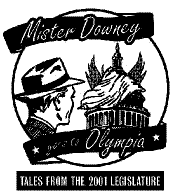NOTHING INSPIRES bipartisanship like a common enemy. Legislative Republicans and Democrats may disagree about who’s responsible for the state’s economic, energy, and education woes, but they know who’s stuck them with another messy problem: the state leadership of their own parties.
The parties’ bosses want to kill the state’s so-called “blanket” primary election law. In many states, voters are required to identify their party affiliation when they register to vote. Their choice determines who they’re allowed to vote for in primaries: Registered Republicans can pick their favorite from an all-Republican list but can’t “cross over” and vote for a Democrat, even if they prefer a Democrat for some particular office.
Weird as this sounds to anyone not used to it, it makes a kind of sense. When you vote in a primary, you’re not electing the candidates to public office; you’re nominating them, choosing one from a slate selected by a political party to represent it in the general election.
The state party bureaucrats, understandably enough, hate Washington’s vote-for-anybody-you-like-for-any-office primary system. It weakens their influence over the electoral process and encourages independence among voters and candidates as well. (If you have to appeal to a majority of all voters in your district, who are you going to work harder to please: your state party central committee or the people?)
Elected senators and representatives in the state Legislature, even though they are all members of the Republican or Demo-cratic parties, on the other hand, love the blanket primary. They were elected under this system, and they know that their constituents—while including people of every political party—are mostly made up of people who don’t formally belong to any party at all.
Every 20 years or so, the party bosses, despite the objections of elected officials, have tried to kill the blanket primary but made no headway until last year, when the US Supreme Court declared California’s nearly identical primary law unconstitutional.
After the Supreme Court’s decision, Washington state’s political parties immediately filed suit to have our blanket primary eliminated. Judge Franklin Burgess, who is hearing Washington’s case, agreed to allow our 2000 primary to take place under the old law but gave the state Legislature a March 1 deadline to come up with a new primary law satisfying the terms of the Supreme Court decision. If the Legislature fails, Judge Burgess will impose a solution of his own.
THE HOUSE WAS FIRST off the block with legislation to resolve the issue. The bipartisan bill introduced January 29 by Mill Creek Republican Dave Schmidt and Vancouver Democrat Val Ogden is a work in progress but a pretty slick piece of legislation considering that it has to satisfy the courts, the parties, the Senate, and the governor. HB 1551 provides a way for voters to register as party members if they want to; it gives the parties more control over who runs in their name.
But it still allows voters who don’t choose to stick a party label on themselves to vote for any candidate they like in primaries, and this, say state party leaders, is precisely the behavior that so compromises their civil rights. Chris Vance, recently elected chair of the state Republicans, puts it bluntly: “As much as the public is in love with its blanket primary, they can’t have it.” The Democrat’s chair, Paul Berendt, says the House bill is “a good start” but fails to address the “core issue”: permitting crossover voters to adulterate the integrity of the nominating process.
Berendt at least seems to be realizing that if the parties win their lawsuit, they may lose the war. A Seattle Times poll just before last September’s primary showed that as many as three-quarters of those planning to vote would have second thoughts if forced to disclose their names and other personal data to a party database in order to do so. Voter turnouts are already close to historic lows—do the parties really think the credibility of government would be increased if they fell by another 75 percent?
The legislation proposed by the House is explicitly meant to offer the parties a face-saving compromise. If the parties reject it, another bill already simmering in the Senate could leave them worse off than they were before—one which would introduce a “Louisiana-style” runoff system in Washington state. In Louisiana, unique in the United States, the election for any given office is over if one candidate gets a majority in the primary. If no one does, the top two vote-getters advance to the general election—whatever party hat they happen to be wearing. Both provisions would leave state parties with even less control over the process than they have now.
Should the parties challenge the (constitutionally untested) Louisiana plan, the Senate bill’s main backer, Julia Patterson of Normandy Park, warns she has another bullet in her bandolier they’ll like even less: legislation to turn the whole primary process over to the parties and let them foot the bill for it as well, an estimated $4 million per election. (Currently the taxpayers, not the party membership, pay for the costs of the primary.)
The parties have powerful incentives to insist on compulsory party identification for primary voters. Such voters are sitting targets for party-driven mailings, tele-polls, fund-raisers, and the like. Access is power. But if the price of access is the risk of complete irrelevancy, is it really worth having?
Additional Links
Background on Supreme Court decision and possible alternatives to the present primary system: http://www.secstate.wa.gov/elections/bp_report.htm
Seattle Times poll on primary preferences: http://archives.seattletimes.nwsource.com/cgi-bin/texis/web/vortex/display? slug=prim21m&date=20000921&query=George+Lamphier
The House bill: http://www.leg.wa.gov/pub/billinfo/2001-02/house/1550-1574/1551_01292001.txt
Washington State Democrats: http://www.wa-democrats.org/
State Republicans: http://www.wsrp.org/








